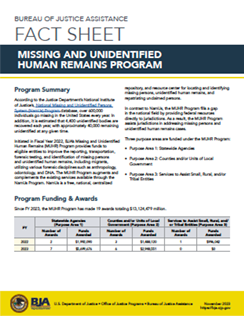The Missing and Unidentified Human Remains (MUHR) Program provides funding to eligible entities to focus on reporting and identifying missing persons and unidentified human remains, including migrants, across the United States. Specifically, the program allows applicants to utilize funds to inventory cases, report information into national databases, transport cases, process cases using forensic technologies, and repatriate human remains.
Why the Program Is Important
There is an increase in missing persons and unidentified human remains cases across the United States every year. Additionally, there is a backlog of cases that need to be processed with forensic testing and entered into national databases in an attempt to identify and repatriate individuals to their loved ones. Many agencies lack the resources to dedicate staff and technologies to the challenges of identifying and reporting missing persons and unidentified human remains.
Purpose Areas
The MUHR Program consists of three Purpose Areas:
- Purpose Area 1: Statewide Agencies
- Purpose Area 2: Counties and/or Units of Local Government
- Purpose Area 3: Services to Assist Small, Rural, and/or Tribal Entities
View the fact sheet.
Awardees under Purpose Areas 1 and 2
- Inventory: Inventory all missing persons and unidentified human remains cases and enter qualified cases into NamUs, the National Crime Information Center (NCIC), and, where applicable, the Violent Criminal Apprehension Program (ViCAP).
- Report: Report missing persons and unidentified human remains, including migrants, in NCIC and NamUs and notify relatives of missing persons/unidentified remains, as applicable. Determine which additional reporting systems may enhance resolution of missing persons and unidentified remains cases within their jurisdiction.
- Identify: Determine which of the inventoried cases need to undergo identification efforts. Develop a comprehensive plan for case prioritization to select cases that may be associated with a threat to public safety (e.g., victim of a violent offender) and a plan for identification to select the proper method for each specific case. Establish a multidisciplinary team (e.g., forensic experts, investigators, victim advocates) to establish the best method of identification for each case.
- Repatriate Human Remains: Agencies shall develop and implement a plan to return human remains to appropriate relatives, as determined by law.
Awardees under Purpose Area 3
- Serves small, rural, and/or tribal entities by funding transportation, testing, and identification of missing persons and unidentified human remains, including migrants.
- Report: Work with/assist submitting agencies to ensure their jurisdictions report missing persons and unidentified human remains, including migrants, in NCIC and NamUs and notify the relatives of missing persons/unidentified remains, as applicable. Determine which additional reporting systems may enhance resolution of missing persons and unidentified remains cases within the jurisdictions of small, rural, and/or tribal entities.
- Identify: Accept cases from small, rural, and/or tribal entities for identification efforts. Develop a comprehensive plan for case prioritization to select cases that may be associated with a threat to public safety (e.g., victim of a violent offender) and a plan for identification to select the proper method for each specific case.
- Repatriate Human Remains: Develop and implement a plan to assist submitting agencies with the return of human remains to appropriate relatives, as determined by law.
Eligible Applicants
- States (any state of the United States, the District of Columbia, the Commonwealth of Puerto Rico, the Virgin Islands, Guam, American Samoa, and the Commonwealth of the Northern Mariana Islands)
- Units of local government
- Accredited, publicly funded, Combined DNA Index System (commonly known as “CODIS”) forensic laboratories
- Medical examiner offices
- Accredited, publicly funded toxicology laboratories
- Accredited, publicly funded crime laboratories
- Publicly funded university forensic anthropology laboratories
- Nonprofit organizations that have working collaborative agreements with state and county forensic offices—including medical examiners, coroners, and justices of the peace—for entry of data into CODIS or NamUs or both


